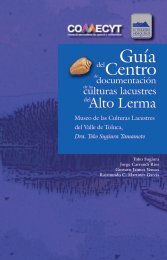You also want an ePaper? Increase the reach of your titles
YUMPU automatically turns print PDFs into web optimized ePapers that Google loves.
KORPUS <strong>21</strong>, VOL. 2, NÚM. 4, 20<strong>21</strong>, 201-<strong>21</strong>8<br />
tional institutions such as the United Nations<br />
and the NGO-ization of global feminism,<br />
both of which offered important material<br />
support for women’s activism. This process<br />
had started in earnest during the planning<br />
and execution of the 1975 conference and<br />
marked the shift from the dominance of<br />
NGOs that enjoyed consultative status with<br />
the UN to a new brand of activist NGOs that<br />
drew together activists and resources from<br />
around the world to focus on issue-specific<br />
programs. Feminist scholars have, for nearly<br />
two decades, debated the impact of the<br />
NGO “boom” on women’s activism, particularly<br />
in poorer communities. These debates<br />
drew critical attention outside strictly scholarly<br />
circles as well. Cecilia Olivares, an editor<br />
of the Mexican feminist journal Debate<br />
feminista, explains that one of the journal’s<br />
hottest-selling issues centered on a roundtable<br />
about NGO funding, which she describes<br />
as “a polemical topic like few others<br />
within the [feminist] movement” (Olivares<br />
Mansuy, 2004: 77). For a consideration and<br />
reconsideration of the NGO-ization of Latin<br />
American feminism, see (Alvarez, 2009).<br />
The civil-society organizations that stepped<br />
forward in response to the 1980s structural-adjustment<br />
programs and the 1985 Mexico<br />
City earthquake emerged not as a spontaneous<br />
irruption of civil society but rather<br />
from networks born during the 1975 International<br />
Women’s Year and nurtured on the<br />
leftist politics and cosmopolitan lifestyles of<br />
Mexico’s feminist activists.<br />
The publication La Correa Feminista<br />
exemplifies how these three issues articulated<br />
by the 1990s. Started in 1991 by the<br />
Mexico City-based Centro de Investigación<br />
y Capacitación de la Mujer (CICAM), an organization<br />
funded by a feminist NGO connected<br />
with Germany’s Green Party, the<br />
magazine was most closely identified with<br />
its principal editor: the Bolivian-born, Chilean-raised,<br />
Mexico-adopting lesbian feminist<br />
Ximena Bedregal. La Correa grew<br />
amid critiques of foreign NGOs’ mounting<br />
influence over local and regional feminist<br />
organizations; by the early 1990s, it had<br />
gained regional recognition as one of the<br />
most vocal critics of NGO-ization (Rivera<br />
López, 2010; see also Biron, 1996). The<br />
magazine published trenchant critiques of<br />
neoliberalism and capitalist development<br />
mo<strong>del</strong>s, lambasted militarism along with<br />
ongoing human-rights abuses (including<br />
the Mexican government’s response to the<br />
1994 Zapatista uprising), and, above all, the<br />
institutionalization of feminism that blunted<br />
its critical impact. Perhaps unsurprisingly,<br />
by 1998 the editors of La Correa found<br />
they could no longer sustain these contradictions.<br />
The magazine required external financing<br />
that it could not obtain in Mexico,<br />
particularly given its pointed critique of the<br />
PRI. Although the editors insisted that they<br />
remained completely autonomous, they felt<br />
that editorial consistency required them<br />
to renounce NGO funding; the magazine<br />
promptly was dissolved. Bedregal moved<br />
her activism on-line and for six years wrote<br />
a regular feminist column for La Jornada entitled<br />
“Triple Jornada”.<br />
In many ways, Bedregal’s career (her ridículum<br />
vitae, as she calls it) captures IWY’s<br />
legacies for Mexican feminism –the prominent<br />
role of lesbian activists and cosmopolitan<br />
intellectuals, the ambivalent embrace of<br />
NGOs and antipathy toward the state, and<br />
the efforts to commandeer mass media to<br />
feminist ends. But the La Correa Feminista<br />
also illustrated the ways that feminist movements<br />
never escaped their geopolitical<br />
context. Much as Echeverría sought a place<br />
on the world stage, casting Mexico in the<br />
role of the leading Third Worldist man battling<br />
the imperialist villains, Carlos Salinas de<br />
Gortari –eying the leadership of the World<br />
Trade Organization rather than the United<br />
Nations– reprised Mexico’s role, playing it<br />
this time as a neoliberal free-trader, offering<br />
NAFTA in lieu of the Carta Echeverría. Similarly,<br />
Mexican civil society –the heroines of<br />
the 1970s performance bravely struggling<br />
against a repressive regime– by the 1990s<br />
found themselves cast as the handmaiden<br />
of neoliberalism that helped to usher in the<br />
policies of structural adjustment, even as<br />
feminist efforts from neighborhood organizations<br />
to transnational networks forged<br />
<strong>21</strong>3



![bicentenario_1[V2]](https://img.yumpu.com/68677971/1/167x260/bicentenario-1v2.jpg?quality=85)
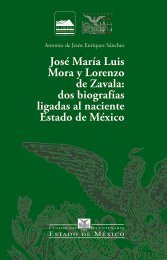
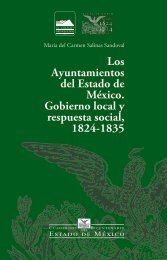
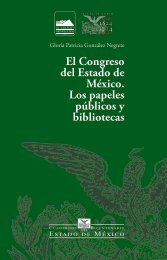
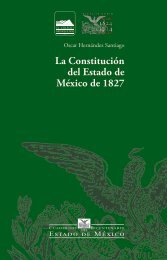
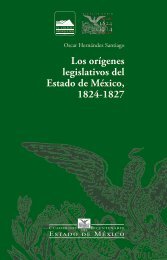
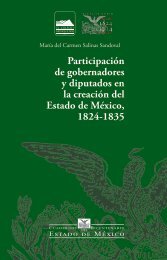
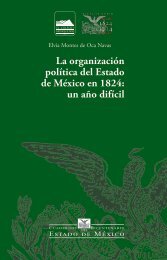
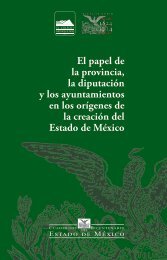

![El_primer_federalismoEM[final]_compressed (2)](https://img.yumpu.com/68483279/1/178x260/el-primer-federalismoemfinal-compressed-2.jpg?quality=85)


